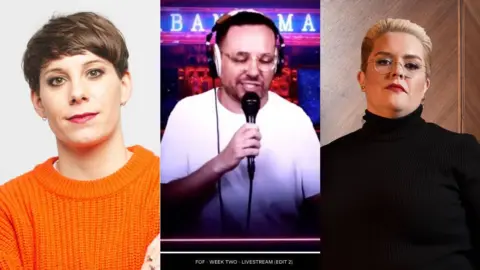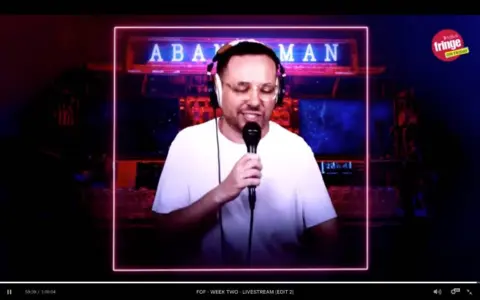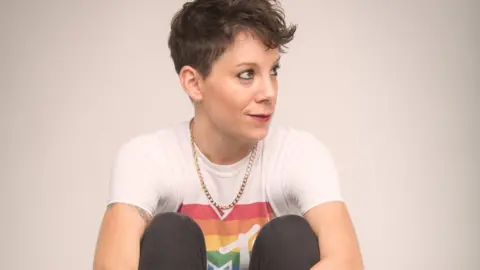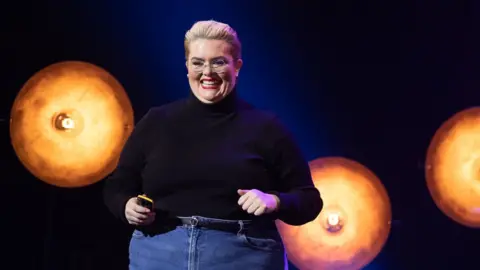'It's a scary time for stand-up comedians'
 Fringe on Friday/Shedinburgh
Fringe on Friday/ShedinburghThe last real comedy show that stand-up Rob Broderick played to a room full of real people was in mid-March, at Adelaide's Corona Theatre.
"Literally the last words I said on a stage were, 'Goodnight Corona!'" he tells the BBC.
"Then it was 24 hours in the air, and when I landed most of my work was gone."
The Irishman, who performs under the name Abandoman, was supposed to follow up his stint Down Under with a residency at this month's Edinburgh Festival Fringe. But the coveted event has been canned for the first time in 73 years due to the Covid-19 pandemic.
So instead, Broderick and his comedy peers, including Suzi Ruffell and Jayde Adams, have been playing a series of Fringe on Friday fundraising live streamed gigs via its online replacement - billed as "a Fringe reimagined" - to raise money for out-of-work comics and comedy venues at risk of closure.
 The Fringe on Friday
The Fringe on FridayRuffell, who you may know from her recent podcast series Out with Suzi Ruffell, normally likes to throw herself around the stage. So sitting down to tell stories into a fixed camera has felt a bit strange.
"Basically you have to think of your material like an Alan Bennett monologue," she says.
"So it's not really stand up per se. Don't get me wrong, it's really good and people have recorded really funny stuff. [But] It's not quite live comedy. It's filling a gap until we can get back on stage".
'I was still funny'
Unlike Broderick and many others, she has briefly graced an actual stage again recently, for a couple of newly allowed socially distanced gigs - including The New Normal Festival and an Off the Kerb drive-in show.
"When I came off-stage I could have cried with relief because I was still funny," she says, after nearly six months off the live comedy circuit.
"I was relieved I hadn't lost the thing I've been working for 12 years on - making people laugh - and I felt I'd have some sort of religious experience, I was so happy."
 Fringe on Friday
Fringe on FridayHowever, many drive-in comedy and music gigs were scrapped before they ever really began, due to fears about local lockdowns and finances.
Adams also played one but was less thrilled by the experience, and has no intention of "performing to cars" ever again. She doesn't much care for "Zoom gigs" either. "It's like I used to be a stand-up and now I'm a YouTuber!" she says.
She is, however, looking forward to filming a one-off special live show in a shed on Tuesday for the the brilliantly-named Shedinburgh - another fundraising event, loosely linked to the Fringe.
Edinburgh 'is really expensive'
The 2016 best newcomer nominee has been involved in getting UK live comedy back up and running with a series of Save Live Comedy shows at the Clapham Grand.
Adams, who has also hosted the BAFTA-nominated Channel 4 show Snackmasters, and Crazy Delicious, is fearful that "there'll be no live comedy circuit to go back to" and that a £1.57bn government arts bailout won't filter down to lesser known comedians.
"Not everyone can adapt and do telly, not everyone can do radio, not everyone can write a show," she says. "Most comics, like actual stand-up comics working in the UK, do not go to Edinburgh Fringe.
"They might go up and do spots but they don't do a main show because no-one could afford it. It's really expensive."
 Shedinburgh
ShedinburghRuffell is similarly concerned about the impact on "working-class comics", and hopes that when the festival - which gives great exposure - returns properly, it does so in "a more affordable way".
There haven't been many positives to come out of 2020, but "not having to find a flat in Edinburgh [for a month] and not having to pay to do the Fringe" have been two for comedians, she laughs.
"It's a really scary time for stand-ups and I wonder whether there will be people that don't see the other side of this," she says. "Or maybe it'll take them a while to go back to being full-time comics, as I worry where the work is going to come from if the venues aren't there."
The advent of virtual front rows for some online gigs, where 30 or so viewers at home can switch on their own cameras and be heard and seen by the comedians, have been trialled by the likes of Kiri Pritchard-McLean at the fictional pub The Covid Arms, and Jason Manford.
Ruffell believes this approach, with the "call and response" element semi-restored, will make an online show "feel more like a proper gig" in the interim.
'As dynamic as an Edinburgh show'
Despite it being an uncertain time, Broderick - whose act involves improvising and interacting with the audience to come up with a topical song - says he's actually enjoyed having the extra time at home to "upgrade the skillset".
He began doing three or four Instagram gigs a week and his brain soon "started equating hearts bubbling up from the screen as people having a good time" in lieu of laughter, he says.
Several months on, his show is now "pretty ridiculously produced", with multi-layered graphics that trigger music.
He's also found that audiences are more willing to offer up suggestions online than they are in the daunting environment of a club. And, of course, he doesn't have to cart his heavy-duty kit around night after night.
'A place where we have a voice'
While Broderick is making working from home work for him, not all comedians are as good with the tech.
For others, particularly older generation, the removal of a proper live scene has killed their entire act, and Adams notes, "battered their confidence".
"Comics invariably have a lot of mental health issues," she continues. "It's more than just a job for us, it's a place where we have a voice."
That's why they need rooms like the Corona Theatre to survive beyond coronavirus.
"The great thing about comedy is, if someone likes you, you can you can have a career for the rest of your life," says Adams. "We do have comedy audiences who will still log in and watch us, even though they'd rather be in a room with us, because we shine.
"The magic happens inside the room, not in these [Zoom] chats. But we're doing what we can."
